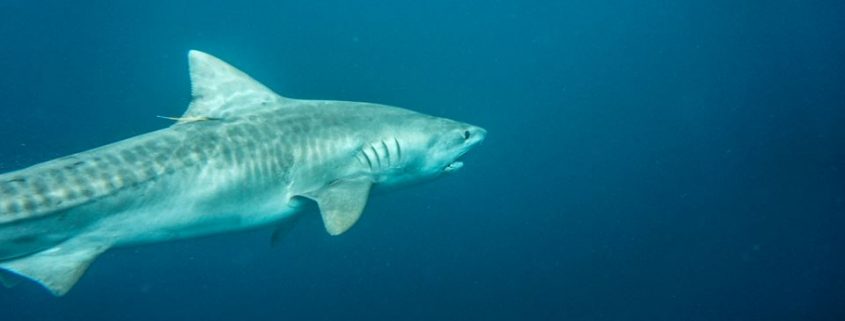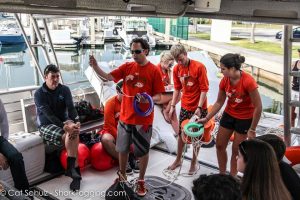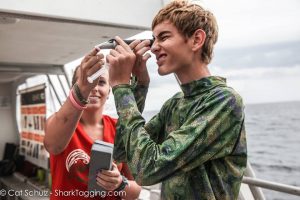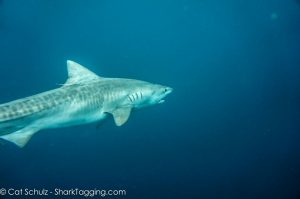Shark Tagging with Westminister Christian School 9/19/2014
By Hanover Matz, RJD Intern
September 19th proved to be an exciting trip to begin the fall RJ Dunlap shark tagging season. Students from Westminister Christian School joined the RJ Dunlap interns along with Dr. Neil Hammerschlag at the Crandon Marina for a successful day of shark research. The interns loaded the gear onboard as Captain Eric prepared the Diver’s Paradise boat for departure. Once the students arrived, we were ready to set off for the nearby waters just off the coast of Miami. As we made our way out to sea, Dr. Hammerschlag briefed the students on the various research techniques we would be employing that day. Morphological measurements, fin clip samples, nictitating membrane tests, and blood samples would be collected in order to gain valuable data from any sharks we caught.
After reaching our destination, the RJD interns with help from the students of Westminister Christian began setting out the drumlines. Each line consists of 70 feet of monofilament attached by a swivel to a weight that rests on the sea floor. The swivel allows any hooked sharks to remain swimming and breathing, as sharks are ram ventilators. At the end of the line is a circle hook that allows for the safe capture of sharks without damaging their internal organs. Once ten drumlines had been set in the water, they were allowed to soak for an hour. The students helped the RJD interns collect environmental data in the meantime on water temperature, salinity, and dissolved oxygen levels. This information provides a better understanding of the environmental conditions encountered by different shark species.
Once one hour had passed, we returned to the lines to see what we had caught. Our first shark of the day was a small blacknose shark. The RJD team quickly brought the shark onboard and secured it to the platform. A water pump is placed in the shark’s mouth to pump water over its gills, helping it to breathe and remain calm during the workup procedure. The students assisted in quickly measuring, sampling, and dart tagging the shark before it was released back into the water. While the blacknose was a good start to the trip, the weather decided to take a different course. A steady rain began to pelt the boat as we headed to collect the other lines, and we could see downtown Miami receiving its own dose of showers in the distance.
The weather may not have held up, but our luck in bringing in sharks did. The team was able to bring in a large nurse shark next. Unlike the blacknose shark and other shark species, these powerful animals lead a less active lifestyle on the ocean bottom, and do not need to continuously swim to breathe. We performed a work up on the nurse shark, collecting all the necessary data, and then released it back into the water. Samples such as dorsal fin clips and blood can give us a better understanding of shark diets and physiology.
The remainder of the trip saw us bring in another nurse shark and two tiger sharks. The tiger sharks were truly an amazing sight for the RJD team and students. Both tiger sharks measured over six feet in length. Such large animals are key predators in the ocean ecosystem, often exerting top down control from the peak of marine food webs. One of the tiger sharks seen that day circled the boat a few times, offering us a beautiful sight of its dark stripes that give the animal its common name. With three more sharks tagged and released, we reached a total of five sharks for the day. In an area so close to a major city with increased pressures on marine ecosystems, even seeing one shark can be a lucky experience. The data the Westminister Christian students helped collect on these sharks will be invaluable in contributing to ongoing research in shark biology and conservation.
We headed back to the dock after an exciting day of shark research. The students departed from the boat, hopefully with a greater appreciation for one of nature’s most amazing predators. We cleaned and stored the gear, enthusiastic after what promised to be a great start to a successful season of shark tagging.







Leave a Reply
Want to join the discussion?Feel free to contribute!